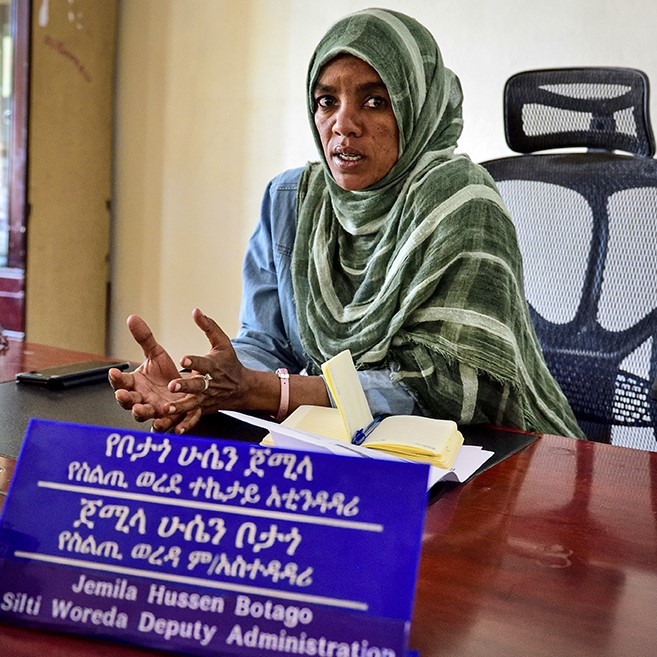Speeches Shim

Jemila Hussein is the chief administrator of Silti woreda, located in the Southern Nations, Nationalities and People’s Region (SNNPR) of Ethiopia. There, she is in charge of ensuring that people in her community have access to essential services they need to prosper in life, whether it is basic education, or safe and sustainable water sources for drinking and for irrigating the lush farmlands within the country’s breadbasket.
Jemila has also championed the cause of providing affordable healthcare for families and individuals living in Silti.
When Community-based Health Insurance -- known commonly as CBHI -- was introduced to her area in July 2016, Jemila committed herself immediately to ensuring that families in her community had every opportunity to enroll in the insurance scheme and eliminate out-of-pocket health expenses.
USAID has partnered with the Ministry of Health and the Ethiopian Health Insurance Agency to establish Community-based Health Insurance scheme. For under $10 per year, membership covers the costs of routine medical check-ups, medicine and treatment, and even emergency surgical procedures -- which otherwise can send families into debt and into poverty.
To date, more than 20 million Ethiopians have enrolled in Community-based Health Insurance across the country.
In Silti, administrator Hussein convened the woreda general assembly and dedicated an entire day to discussing how the local government body would support, mobilize and administer Community-based Health Insurance – from registering clients, collecting membership payments, and establishing a referral system to local health centers and medical providers.
Jemila also asked other woreda officials to sign letters of commitment to secure their dedicated support, and she assigned staff from other government offices to assist the CBHI team.
In just two weeks, Jemila and her team of government and health officials in Silti had an operational plan in place to begin rolling out Community-based Health Insurance.
“We were able to finish most of the work in one week,” Jemila says. “The second week, there were only bits and pieces of work here and there.”
In 2019, Community-based Health Insurance membership had reached over 20,000 households in Silti amounting to over 98 percent of all eligible households in the area – an impressive feat considering a regional average of 35 percent across other woredas where this health insurance membership is offered.
Moreover, the customers in Silti are satisfied; each of the previous years’ members have continued to renew their membership and 4,500 new households joined the scheme.
Consistently high CBHI implementation has helped Silti woreda win awards two years in a row from the SNNPR regional health bureau—including a computer and printer, which have helped Silti officials incorporate better data management into their health system operations.
“Our success in CBHI has created a feeling in us where we wish we could replicate similar success in other sectors,” Jemila said.

Comment
Make a general inquiry or suggest an improvement.